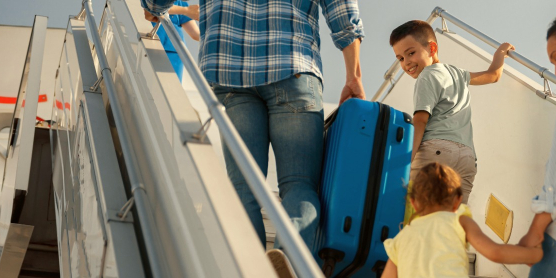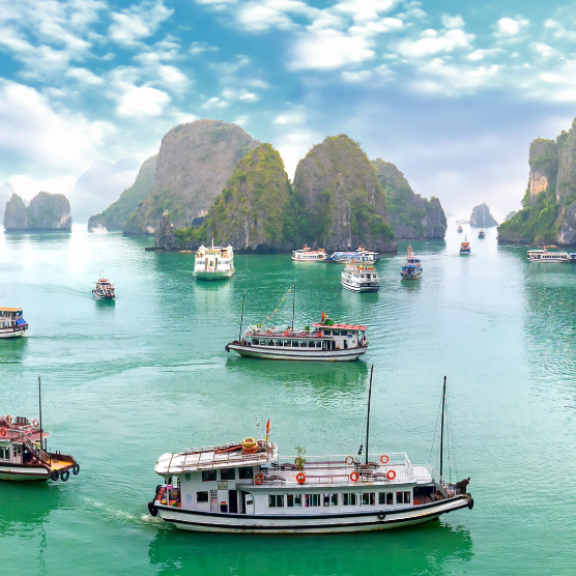
Emigrate to Vietnam
Emigrate to Vietnam: Find out the most important information for your stay here
Emigrating to Vietnam is a great way to live a life with a low cost of living, as your money simply goes further here - be it for food, housing or entertainment. At the same time, Vietnamese culture inspires with its variety of traditions and customs, the friendliness of the people, the delicious food and numerous festivals. Anyone thinking about emigrating to Vietnam will also be fascinated by the breathtaking nature: from the impressive mountain landscapes in the north to the paradisiacal beaches in the south, Vietnam offers an incomparable variety of landscapes. In dynamic cities such as Hanoi and Ho Chi Minh City, traditional architecture and modern life merge. A vibrant atmosphere with a wide range of shopping and entertainment options awaits you here. And last but not least, the world-famous Vietnamese cuisine is a delight for all the senses - with fresh ingredients and a perfect balance of flavors.
Facts about Vietnam
Capital City
Hanoi
Population
98,858,950
Surface Area
128.066.225 mi² or 331,690 km²
Continent
Asia
Official Language
Vietnamese
Currency
Vietnamese Dong (VND)
Emigrating to Vietnam: An overview of the political system
Emigrating to Vietnam means moving to a socialist republic where the Communist Party is the sole ruling force. The one-party system ensures political stability and a centrally planned economy that pursues socialist values such as equality, social justice and state control over major industries. These structures create a clear political direction and make Vietnam a stable country where political upheaval is rare.
For foreigners, Vietnam offers many freedoms despite the lack of a multi-party democracy. If you want to emigrate to Vietnam, you can largely organize your own life, but you should respect the existing laws and cultural customs. It is particularly important to find out about local regulations before emigrating, as these can shape your everyday life. Social interactions also benefit from treating the political structures and culture with respect.
There are some challenges: Internet freedom is restricted, political demonstrations are banned, and corruption can be an issue. Nevertheless, with good preparation and a conscious approach, life in Vietnam can be managed well.
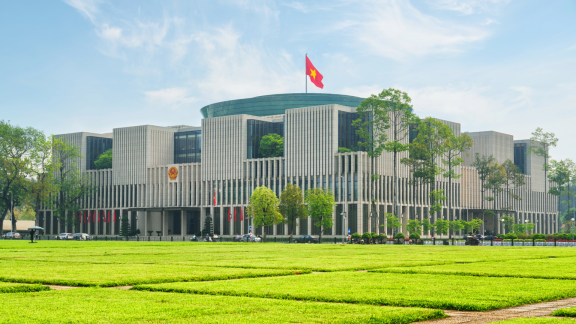
Climate in Vietnam: Important information for emigrants
Emigrating to Vietnam requires an understanding of the country's different climate zones. Northern Vietnam has four seasons, similar to Europe, with cool, dry winters and hot, humid summers. Central Vietnam is characterized by a tropical monsoon climate, with a rainy season from September to January and mostly dry weather the rest of the year. In the south of the country, it remains hot and humid all year round, although the rainy season is less pronounced than in the north.
If you want to emigrate to Vietnam, you should know that many parts of the country have a pronounced rainy season, especially from May to October, with heavy rainfall. Between May and November, there is also an increased risk of storms in central Vietnam. Humidity is generally high, especially in the coastal regions. As Vietnam is a very sunny country, sun protection should be part of your routine all year round.

Healthcare system in Vietnam: Important facts for emigrants
Emigrating to Vietnam also means getting to grips with the country's healthcare system. It offers solid basic care, although standards in cities are often higher than in rural areas. Public hospitals are cheaper but less comfortable, while private hospitals offer fast, high-quality treatment at a higher cost. In larger cities, you will find Western clinics with English-speaking doctors, and traditional Vietnamese medicine is often used as a supplement.
If you want to emigrate to Vietnam, you should consider private health insurance with international cover. In the country, hygienic conditions can differ from European standards and the language barrier is often a challenge. In addition, some medicines may not be available in Vietnam or may be more expensive than at home.

Emigrating to Vietnam: An overview of the economic situation and quality of life
In Vietnam, the gross domestic product per capita amounted to 4,649.05 US dollars in 2024. The Gini coefficient of wealth describes the distribution of wealth. The indicator is an established, internationally comparable measure of wealth inequality. It is measured on a scale from zero to one. The higher the value, the greater the inequality. The Gini coefficient in Vietnam is expected to be 0,35 in 2025 (source: Statista).
Vietnam impresses with its low cost of living, year-round warm climate and rich cultural diversity. Breathtaking landscapes, from mountains to beaches, and the choice between vibrant cities and quiet villages make life here versatile - ideal for anyone thinking about emigrating to Vietnam.
However, chaotic traffic, sometimes high levels of air pollution and the bureaucratic hassle of visas should be borne in mind. Knowledge of Vietnamese can be helpful. For young people in particular, Vietnam offers an ideal place for new experiences with affordable living, exciting opportunities and unique nature. If you are planning to emigrate to Vietnam, you should inform yourself well beforehand in order to better master the challenges.
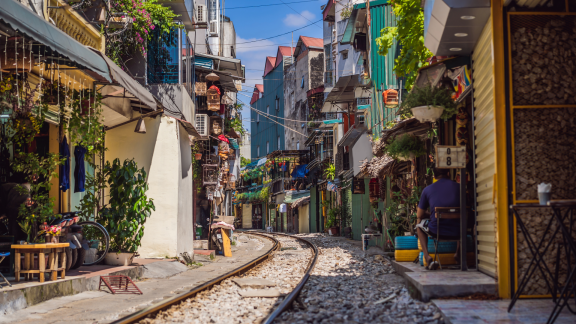
National holiday
Independence Day of Vietnam
The breathtaking landscape in Vietnam
Vietnam impresses with a variety of breathtaking landscapes and cultural diversity. The karst rocks of Ninh Binh, also known as "Halong Bay on land", invite you to take boat tours and bike rides through rice fields and historical sites. The Mekong Delta, known as the "rice granary", delights with lush fields, canals and hospitable villages.
Cat Ba Island impresses with its national parks, endemic animal species and activities such as climbing or cruises in Lan Ha Bay. Northern Vietnam fascinates with spectacular rice terraces, mountains and cultural encounters with ethnic minorities.
The Con Dao archipelago, once a penal colony, is now a protected paradise with rare animal species, luxurious accommodation and untouched nature - an ideal retreat away from mass tourism.
Halong Bay in Vietnam, a UNESCO World Heritage Site, impresses with thousands of rocks jutting out of turquoise waters, around 2,000 islands, fascinating caves and diverse nature. Activities such as boat tours, kayaking, swimming and cave tours make the visit unforgettable. The best time to visit is from April to September, when the weather is ideal for exploring. Early planning is recommended as the bay is particularly popular in high season.
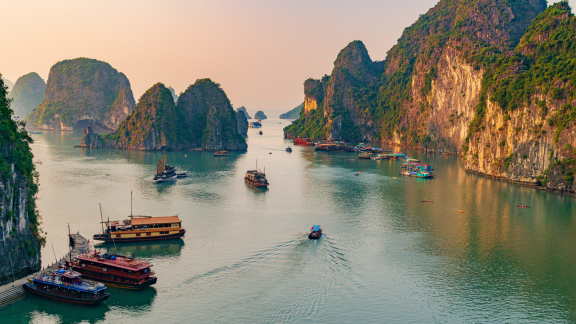
Emigrate to Vietnam- Entry Requirements
Entry is possible for German nationals with the following documents:
- Passport: Yes
- Temporary passport: Yes
- Identity card: No
- Temporary identity card: No
- Children's passport: Yes
Notes/Minimum residual validity:
The travel document must be valid for six months beyond the validity of the visa from the date of entry.
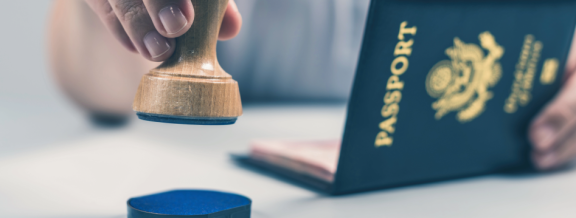
FAQs for emigrating to Vietnam
Where can I find relevant information about my country of entry and the entry regulations that apply there?
We have compiled destination country information as well as entry requirements and customs information for many countries in the Relocation Service section of our website and are constantly expanding this section.
Can I use my own container that I already own for the move with DACHSER & KOLB?
For every removal, which we at DACHSER & KOLB always offer as a door-to-door (full service) removal, a container is rented for the duration of the removal. We therefore do not offer the option of using your own container.
Who is responsible for my move abroad and the services I need there?
As a FIDI member, we work abroad with selected, long-standing partners who work in accordance with our service standards.
Are my removal goods insured in the event of damage?
For every overseas move, we naturally cover transportation insurance at current value for the used household goods and personal belongings
What types of transportation do you offer for overseas relocation?
It is generally possible to carry out overseas removals via air freight or sea freight. In the case of sea freight, it is possible to ship the removal goods as additional cargo (“LCL shipment” with Liftvan) or with a container (FCL shipment in 20 feet, 40 feet or 40 feet high cube). We will be happy to discuss which option is best for you in a personal consultation.
When and how must the move be paid for and what is the payment deadline?
You will receive an invoice a few weeks after placing the order and pay the full amount directly in advance.
Do I have to pay taxes and customs duties on my removal goods?
Removal goods can be imported tax and duty-free into most countries if you have a valid residence permit. We will be happy to check the options for importing the removal goods for your desired destination country in a personal consultation.
Are you interested in moving to Vietnam or another destination country?
Then do not hesitate and contact us today.
Sabrina Klier
Customer Service & Sales - AIR & SEA



